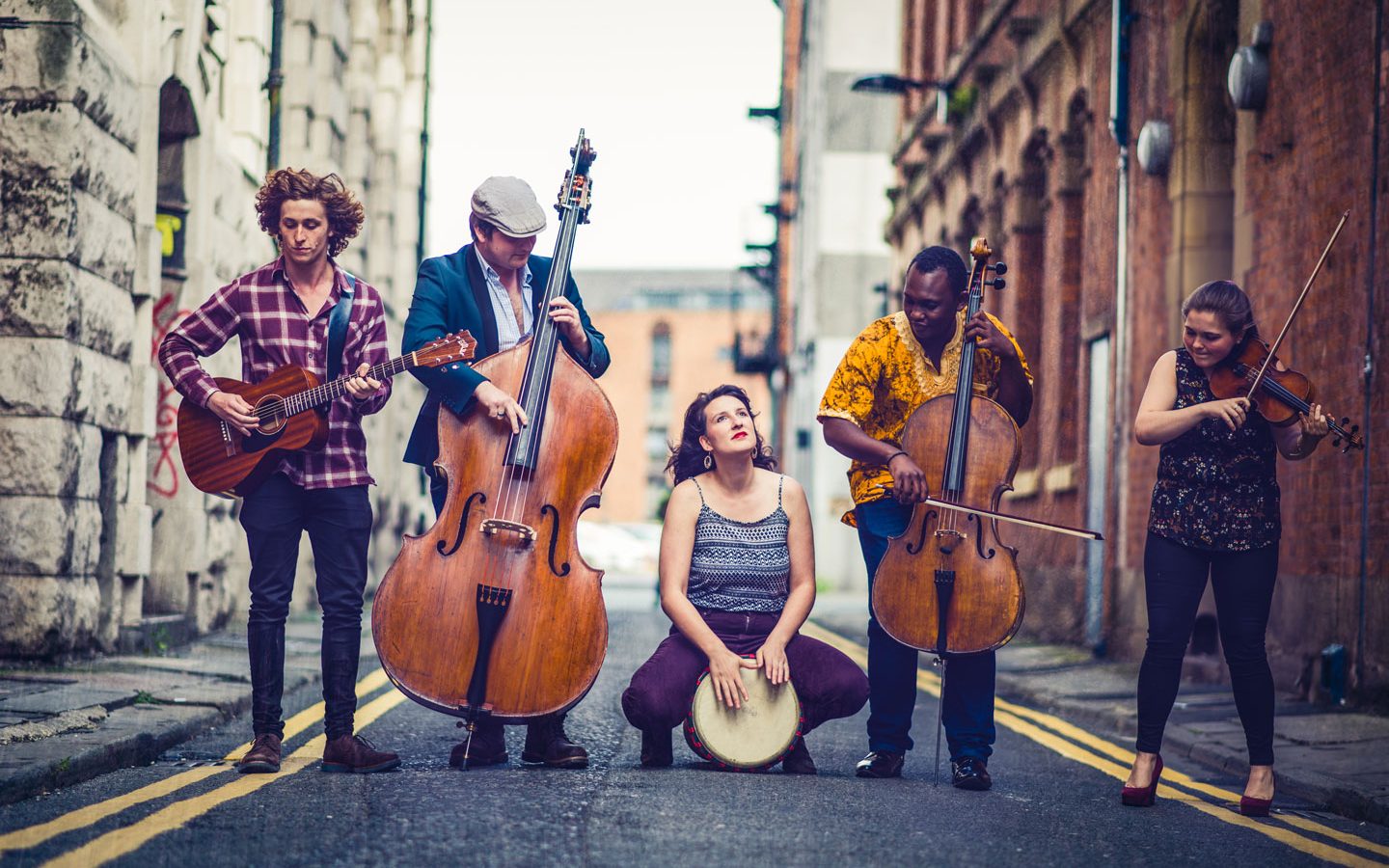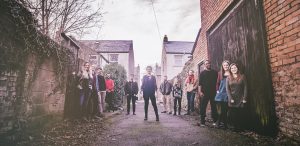Folk fusion outfit Kabantu are one of Manchester’s most adventurous and accomplished folk-rooted ensembles. Recent years have seen them perform at a TED talk, launch their debut album, and give musical tuition to the younger generation: all part of their far-reaching and ambitious work as a group. This week sees them begin another ambitious project, one which has been taking shape for over a year and represents a huge tick on their collective wish list: performing with Wales’ Sinfonia Cymru. Ahead of their Close to Folk premiere at Band on the Wall on Thursday, the group’s violin player, Katie Foster, kindly took the time to tell us how the project came to fruition, how she began playing herself, and which have been the most exciting places for the band to visit thus far.
How did your collaboration with Sinfonia Cymru materialise and what initially were the ideas or ambitions for the project?
Katie Foster: ‘As a quintet, we have a wish list of things which we aspire to achieve over the next few years, one of which being “collaborate with an orchestra”. Luckily Sinfonia Cymru were seeking a similar opportunity, engaging their musicians in a project which not only involved the practical element of performance, but looked to involve them from the foundations — exploring improvisation, arranging and writing original music from scratch. The Welsh identity of the orchestra was hugely important, so we looked at ways to base the project on traditional songs and folk melodies from Wales. Over the course of the project, the repertoire we will perform has incorporated these Welsh cornerstones alongside global folk music, world, jazz and classical music combined and arranged by the performers. Kabantu and Sinfonia Cymru found common ground in ensuring that this new venture into orchestral writing was led by the performers, whilst always staying true to the high level of skill involved in performing as a large ensemble or orchestra.’
As well as performing at the venue, Kabantu have led workshops for aspiring musicians at Band on the Wall. What do enjoy about passing on your musical knowledge and engaging young people with music?
KF: ‘We have all luckily had experiences where we’ve seen or heard the work of professional performers and been moved, inspired or invigorated by their passion for their art. We would hope that the young people we work with through education projects and outreach can experience that also, or at least discover ways to approach music in ways which previously might have seemed impossible. There is a boundaryless concept of sharing within all music and sometimes all it takes is for someone to pass on a tune, idea, rhythm, sound or lyric and suddenly, another aspiring musician has what they need to begin their own musical journey. Increasingly we are seeing and hearing the difficulties which music as a school or community medium is facing. There are numerous organisations across Manchester who are the unsung heroes of ensuring music doesn’t get branded as unimportant and Kabantu are proud to represent them in the work we do alongside them.’
How old were you when you began playing the fiddle, and can you pinpoint any defining influences that have led you to becoming the musician you are today?
KF: ‘After months of begging for violin lessons, I started playing at the age of 7. I had heard the violin played by one of my primary school classmates and was just hooked from that point! I grew up listening to my dad playing jazz, both live — as he’s a clarinettist and saxophonist — and from recordings which were always on at home. I grew up in Edinburgh which naturally promotes traditional Scottish music so there was always an opportunity to hear the violin or fiddle. I was taken to watch Blazin’ Fiddles perform when I was around ten years old and remember being mesmerised by how intricately and effortlessly they all seemed to fly around the instrument. My grandad bought me their CD and I was so determined to recreate their skill that I listened to it on repeat until I could play all the tunes! It was surreal for me at this year’s Shetland Folk Festival as Kabantu shared a few concerts with Blazin’ Fiddles and I was most definitely as starstruck then as I had been aged ten! I love the effect folk music has on people so that strand of the instrument has always been close to my heart. The first time I sat in an orchestra is also an experience I’ll never forget. Even at a young age, I was swept up in the pride and thrill of being part of a huge team. The moment I realised the connection between the necessary discipline you train in and the subsequent ‘feeling at home on my instrument’ with the adrenaline rush of a performance was when I knew I wanted to do that as much as possible. My biggest drive is being able to be flexible across as many genres as possible, improvise, don’t treat it like it’s life and death and experiment because let’s face it, that’s a lot of fun! I think entertainment plays such a huge part in wellbeing and whatever your preference, watching someone get lost in the story they’re telling or the sound they’re creating is addictive and I can’t help but get lost in the buzz of wanting to make that happen.’
Music has taken the band to some impressive places. Where have been the most interesting places to visit and perform, during your time as a group?
KF: ‘We regularly comment on how lucky we are to meet the people we meet and visit the places we visit whilst doing what we love. We haven’t always found our cross-genre identity easy to manage in terms of who we target as an audience, but over the last few years, we’ve come to love our ‘not in any box’ nature because it means we experience the most incredible variety of performance spaces and consequently reach more people. From the Royal Albert Hall in London to a barn in Devon, we have found another way to demonstrate flexibility within what Kabantu stands for. In October 2018, we did our debut international tour across Switzerland. Not only was it an opportunity to visit this stunning country, but it allowed us to experience just how limitless music is in relation to how easily it translates across the world. From fields and village halls to radio studios and world famous stages, our desire is always the same… to leave people feeling wrapped in the warmth of live music.’
What music have you been enjoying recently? Any new discoveries or new areas of interest to report, or perhaps any old favourites that you’re revisiting?
KF: ‘All five of us are always listening to the weird and wonderful alongside our individual favourites! We performed at Shetland Folk Festival back in May and were stunned at the variety of music we heard there- sounds from Canada, America, France and all over the UK. It was a catalogue of not only traditional music but fusion sounds which I know all of us have since listened to a lot. We are currently working on a cross-arts project based in Manchester, focussed on immigration, asylum and cultural identity for which we are writing new music to be performed alongside poetry and stories. In preparation for this, we have researched the music of Kurdistan, Pakistan, Bangladesh and Somalia to understand how their musical cultures were formed, what makes them distinctive and how we can use particular elements in our own writing.’



